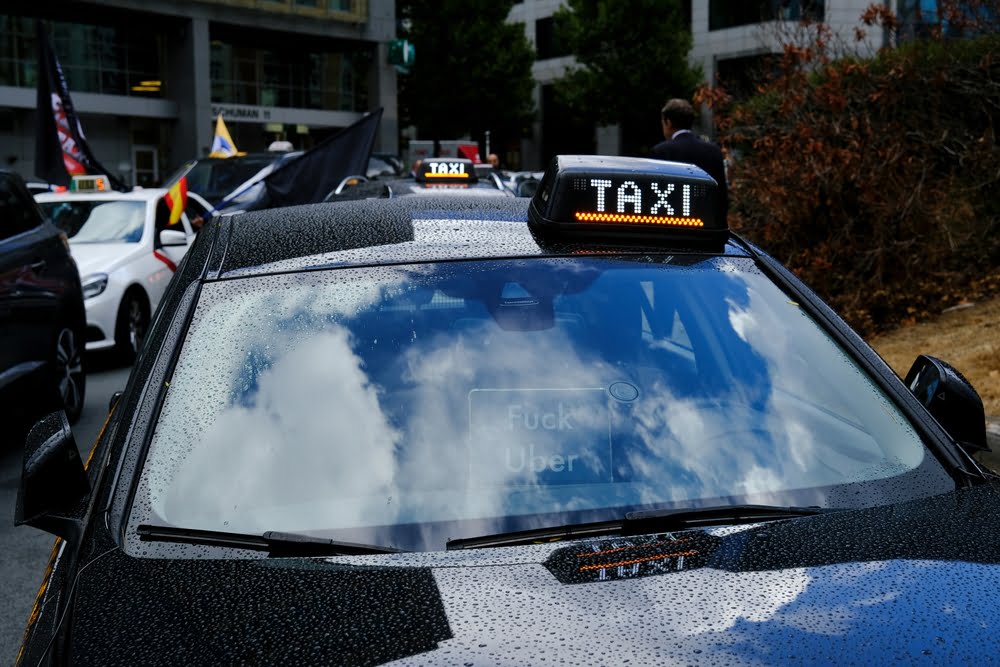The reform strengthens the status of drivers.
The Brussels government has approved the two implementing decrees of the taxi ordinance. They will come into effect on October 21, Prime Minister Rudi Vervoort reports. This reform of the taxi sector is the result of a long political process, but also of broad consultation with the taxi sector. The taxi ordinance, which was approved by the Brussels parliament on 9 June, ensures a unified taxi sector. For example, there will be a common basic statute for stand taxis and street taxis.
This numerus clausus stipulates that 1.425 standing taxis (the current traditional taxis) can be licensed in the Brussels Region. Of these, 150 are intended for people with reduced mobility, 140 vehicles with electric propulsion and 50 with hydrogen. In addition, there is room for 1.825 street taxis (which operate via platforms such as Uber). Of these, 50 are for the transport of people with reduced mobility, 50 are electric and 25 hydrogen vehicles. Finally, there are still 85 permits for luxury vehicles. The numerus clausus will be reviewed every two years, the first time in 2025.
Rates
The implementing decrees also determine the rates for journeys with or without reservation. Only stand taxis can transport customers without prior reservation. The kilometer price is now 2,30 euros (at 1,80 – rate I – or 2,70 euros – rate II now), the entry fee is 2,60 euros (2,40 euros) and the waiting time is 0,60 (0,50). ) euros per minute, while the flat-rate surcharge for night journeys remains 2 euros.
From now on, a minimum price for a ride of 8 euros applies. For journeys with reservation by street or stand taxis, a kilometer price of minimum 1,5 and maximum 3 euros, a waiting time compensation of minimum 40 and maximum 80 euro cents applies. The entry fee is minimum 1,5 and maximum 3 euros. Here too, a minimum price for a ride of 8 euros applies. The government is capping the maximum price at 200 percent to prevent abuse to the detriment of the customer, it says.
For luxury street taxis, a minimum kilometer price of 3 euros, a waiting time of 1 euros per minute and a boarding fee of 5 euros applies. The maximum is capped at 500 percent of the minimum price. Finally, the rate for a ride with a ceremonial taxi is at least 90 euros excluding VAT for a service of three consecutive hours in the context of a ceremony. The rate for each additional hour is EUR 30 per hour. From October 21, the number of permits for taxis for people with reduced mobility (PRM) will be increased to 200, a doubling compared to today.
"This reform should lead to a better service to customers thanks to, among other things, an adapted number of vehicles, a simpler training path for candidate drivers and administrative simplification. Another innovation relates to the platforms, which will have to meet certain conditions in order to finally, the tariff scheme was revised and made clearer for customers."
Prime Minister of the Government of the Brussels-Capital Region

Operators are also encouraged to switch to alternatives to the combustion engine. The aim is to achieve a total of 190 emission-free taxis, 140 electric and 50 hydrogen-powered taxis. VVB (vehicle rental with driver, including Uber drivers) and taxi drivers who have gained at least two years of experience in one of the three regions in the past five years can obtain a certificate of professional competence.
The reform strengthens the status of drivers. From now on, drivers can choose which platform they want to join. The training program has been simplified and adapted to respond to the driver shortage and to take into account the quality and safety requirements of the profession.
electronically
The reform also facilitates administrative management for operators, drivers and reservation intermediaries. From now on, contact with Brussels Mobility will be electronic. The annual renewal for operators and the biannual renewal for drivers as they currently exist will be replaced by unannounced checks by Brussels Mobility. The processing time for extension applications has been shortened to 20 working days. The period of validity of the operating licences, which was seven years for taxis and five years for the rental of vehicles with a driver, will be equated to seven years for street and stand taxis.
Finally, reservation intermediaries must be recognized in order to be able to offer their services. In order to be eligible for such an administrative permit, the reservation intermediaries must meet certain requirements. For example, they must have an operating seat or an establishment unit that is registered with the Crossroads Bank for Enterprises, they must not have any social debts and they must meet honesty conditions.



